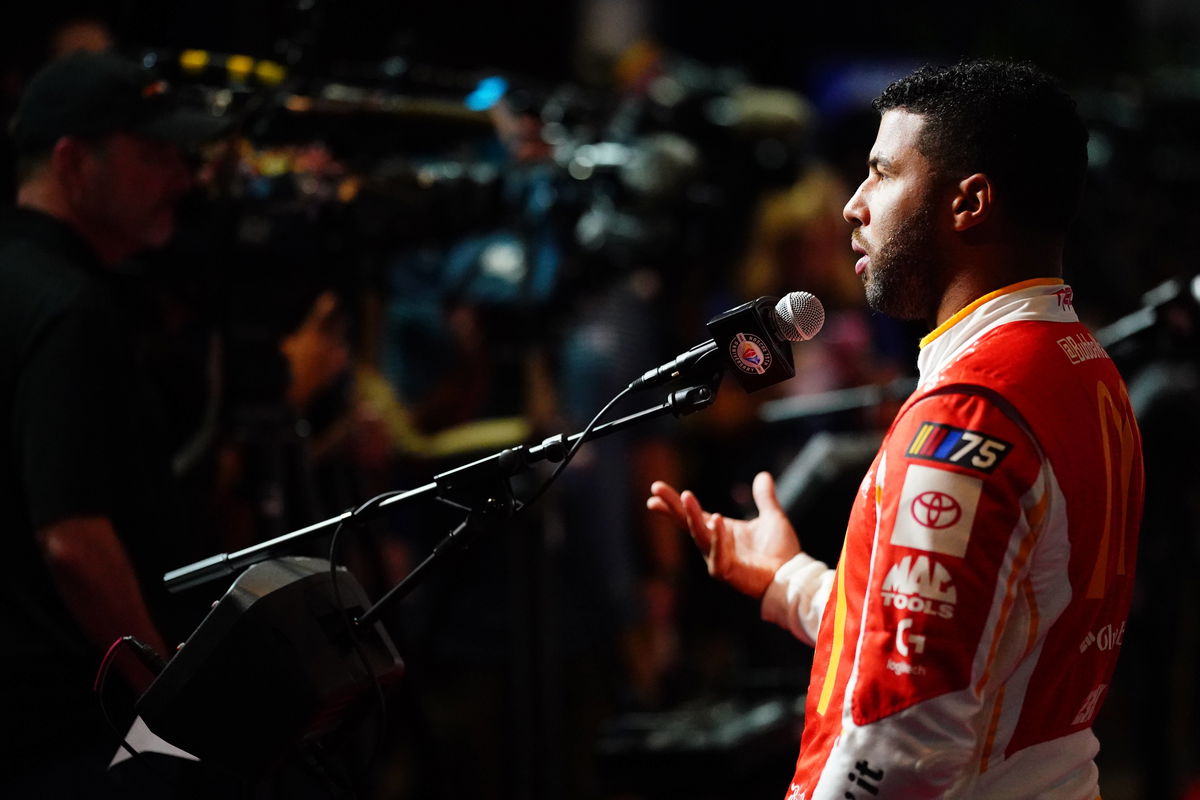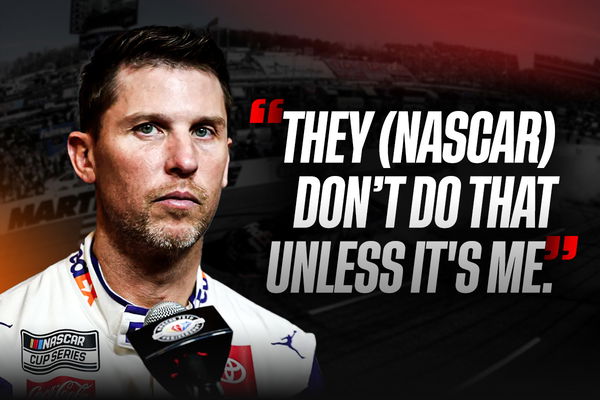
Imago
NASCAR, Motorsport, USA Media Day Feb 15, 2023 Daytona Beach, Florida, USA NASCAR Cup Series driver Bubba Wallace 23 talks with the press during media day at Daytona International Speedway. Daytona Beach Daytona International Speedway Florida USA, EDITORIAL USE ONLY PUBLICATIONxINxGERxSUIxAUTxONLY Copyright: xJohnxDavidxMercerx 20230215_jdm_sx1_026

Imago
NASCAR, Motorsport, USA Media Day Feb 15, 2023 Daytona Beach, Florida, USA NASCAR Cup Series driver Bubba Wallace 23 talks with the press during media day at Daytona International Speedway. Daytona Beach Daytona International Speedway Florida USA, EDITORIAL USE ONLY PUBLICATIONxINxGERxSUIxAUTxONLY Copyright: xJohnxDavidxMercerx 20230215_jdm_sx1_026
“The truth is what the truth is,” said Denny Hamlin after sharing his thoughts on the Gen-6 cars back in 2013. The Joe Gibbs Racing driver has always been notoriously outspoken, but after that race on March 6, 2023, in Phoenix, he crossed a line in NASCAR’s eyes that denigrated “the racing product.”
Watch What’s Trending Now!
It all started when the No. 11 racer candidly said in the post-race interview, “I don’t want to be the pessimist, but it did not race as good as our Generation-5 cars. This is more like what the Generation-5 was at the beginning.” And what followed was an unexpected backlash.
NASCAR vs. the one who “beat your favorite driver”
The parallels are uncanny. Just like the Next-Gen car, NASCAR’s fifth-generation vehicle, better known as the Car of Tomorrow, struggled to gain acceptance from drivers and fans. The reasons were not only down to performance, but also the car’s aesthetics, and the sanctioning body wasn’t having it.
NASCAR fined Hamlin $25,000 from his race winnings after he said, “I’m not going to pay the fine. If they suspend me, they suspend me.” It was one of those instances where honesty itself was penalized, and for a sport that takes pride in grit and toughness, the message was pretty clear. Speak out at your own risk.
Even the legendary Dale Earnhardt, who will always be remembered for keeping it unapologetically raw, kept his honesty strictly to the world of racing. ‘The Intimidator’ never ventured into the territory of social debates or politics, and set the tone for future generations about not crossing into issues that might divide the fanbase. But in a stark contrast, Dale Jr. has tried to open up a ‘safe space’ with his podcast, where drivers can talk more openly about their lives. But that kind of freedom exists outside the NASCAR spotlight, indicating that the only way to be honest is to have your own platform.
Let’s take Bubba Wallace, for instance. As the sport’s only black driver in the Cup Series, he has spoken up about issues beyond racing, addressing the ‘noose’ controversy, racial injustice, and banning the Confederate flag. Even after George Floyd’s murder in 2020, Wallace made a bold statement through CNN, around NASCAR’s safe space.
“No one should feel uncomfortable when they come to a NASCAR race. It starts with Confederate flags. Get them out of here. They have no place for them.” While his words prompted NASCAR to ban the flag, the backlash from fans was immediate, with many flooding his social media with abuse.
Now, Wallace’s situation shows a contradiction in the NASCAR fanbase. While stock car racing enthusiasts want ‘authentic’ drivers who don’t hide behind PR scripts, when drivers do voice out in ways that clash with tradition or politics, the reaction from fans is rarely forgiving.
It’s a lesson the 23XI Racing driver was forced to learn, and fans seem to be warming up to him now that he has adopted a more politically correct approach. That may go on to explain why Chase Elliott, who is pretty ‘reserved’ in front of the camera, has won the Cup Series’ Most Popular Driver Award’ 7 times in a row.
It all comes down to NASCAR’s origins
NASCAR grew out of Southern traditions, with a conservative fanbase and a business model that steered far away from controversy. Drivers are not just competitors but brand ambassadors, and a single misstep in front of the camera can mean millions lost in sponsorship money, affecting a team’s survival. That’s why PR professionals train drivers about what to say, and more importantly, what not to.
Back in the good old days, brands such as Winston, Miller, and Lowe’s didn’t want bad press attached to their logos. And that’s the case even today.
Maybe the NASCAR rulebook has vague but powerful clauses, a lesson Kyle Busch learned the hard way.
Known for his hot temper, ‘Rowdy’ let his emotions get the better of him at Martinsville in 2021, when Brad Keselowski nearly wrecked him before the finish line. Venting out in the post-race interview, Busch let slip, “F—ing re–rded, man,” and went on to say, “I should beat the s— out of him is what I should do.”
Repercussion: He later had to apologize on X, saying, “In one of my post-race interviews, I used a word I should never use and I want to apologize for it.” However, the damage was already done, and the racer was forced to take sensitivity training.
“I should beat the **** out of him right now.”
After the race, Kyle Busch called out Brad Keselowski for his move for second on the last lap.
BUT… if Alex Bowman were to fail post-race inspection, Kyle beat Brad for second and would get the win. #Championship4 #NASCAR pic.twitter.com/eF0sFr0qds
— NASCAR on NBC (@NASCARonNBC) October 31, 2021
His older brother, Kurt Busch, has had his fair share of clashes with the media as well. In 2011, Kurt was suspended for one week following a verbal altercation with ESPN reporter Jerry Punch. And, NASCAR? They were quick to send a clear statement that the line had been crossed too many times by fining him $50,000.
Repercussion: Kurt Busch’s sponsors backed away, and Penske Racing distanced itself by parting ways with the driver, despite him admitting he was “so sorry with the way last year ended.”
Then we have Tony Stewart, who has had his own high-profile run-ins with NASCAR, especially when he chose to be honest instead of adopting a more cautious approach.
In 2008, Goodyear brought a tire compound to Atlanta Motor Speedway that didn’t perform well, prompting ‘Smoke’ to say, “That’s the most pathetic racing tire I’ve ever been on in my professional career.” While his criticism embarrassed the sanctioning body and its tire partner, it was rooted in genuine concern for performance and safety.
Repercussion: Ultimately, Smoke was forced to apologize “to the people who work in the factories and the union workers at Goodyear,” even though he didn’t back down from his claim. The Indiana-native also went on to say, “Our comments last week were not meant to offend those people, because they’re not the ones making the decisions about the racing tires we use. My comments were made in frustration and made to get Goodyear’s attention.”
That’s when it became clear to Tony Stewart that the sanctioning body demanded ‘authenticity’ from drivers, but only if it fit within certain boundaries.
On multiple occasions, NASCAR feels at odds with its own rules. Where drivers want to be able to vent out, raise concerns, and address fans as normal humans instead of corporate spokespeople, the sport’s culture has always been different.
- Sponsors are worried about brand alignment,
- Officials are worried about the sport’s image
- But older fans? They are happy to turn on drivers who say something unpopular.
In all, NASCAR’s best storytellers, like Denny Hamlin, Kyle Busch, Tony Stewart, and Bubba Wallace, are the ones who drive the fandom, hence the sport. Ans, some also feel it’s a stark contrast to other sports, where athletes are encouraged to speak up.

Commissioner Adam Silver has encouraged advocacy in the NBA, saying it’s part of the league’s culture. “I think part of the reason NBA players are more active is that it’s been part of the culture of this league for generations and passed down to them.”
Driver activism is also embraced in Formula 1, with seven-time World Champion Lewis Hamilton pushing for change both on and off the track. He even urged other drivers to be “more outspoken” and regularly uses his platform to promote racial justice and diversity.
However, while that was NASCAR in the past, the landscape is shifting. Podcasts and social media are giving drivers more control over what they want to convey. For many, these platforms are a way to bypass the traditional press entirely, eliminating the risk of being taken out of context or facing the sanctioning body’s wrath.
But the question that many fans have is, what kind of sport does NASCAR want to be? Is it going to continue penalizing drivers for their honesty? Or it will embrace controversy and unfiltered drivers? Or as Denny stated years back, saying, “Inconsistency is the only consistency we have,” will the sport remain the same?
Time will tell.








